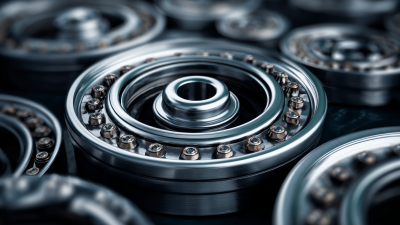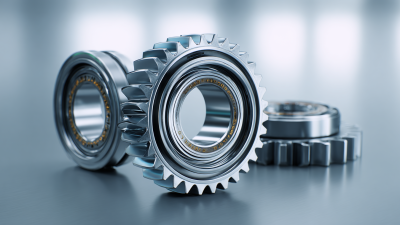Unlocking Performance: The Future of Automotive Bearings in Electric Vehicles
As the automotive industry undergoes a significant transformation with the rise of
electric vehicles (EVs), the role of automotive bearings is set to evolve dramatically.
According to the International Energy Agency (IEA), global electric car sales reached
6.6 million units in 2021, representing a remarkable
108% increase from the previous year. This shift not only highlights the growing
demand for efficient and durable components but also emphasizes the necessity for advanced automotive bearings
designed to handle the unique challenges posed by EVs.
Industry reports project that the market for automotive bearings will reach approximately
$45 billion by 2025, with a considerable portion attributed to the
electric vehicle segment. The future of automotive bearings will focus on enhancing
performance, reducing weight, and increasing reliability, thus unlocking new possibilities for
energy efficiency and sustainability in electric mobility.
The Role of Advanced Materials in Enhancing Bearing Durability for EVs
The shift towards electric vehicles (EVs) is fundamentally reshaping the automotive industry, with a critical focus on enhancing the performance and durability of automotive bearings. As the demand for lightweight and high-performance components increases, advanced materials such as 2D MXenes are emerging as frontrunners in meeting rigorous requirements in electromobility. With their unique properties, these materials are poised to significantly boost bearing efficiency, thereby improving overall vehicle performance and energy consumption.
The automotive bearing market is projected to reach a staggering USD 38.31 billion by 2031, showcasing a compound annual growth rate (CAGR) of 6.12% from 2024 to 2031. This growth underscores the increasing emphasis on innovative bearing solutions tailored specifically for electric and hybrid vehicles. Companies are investing in the development of smart bearings and advanced materials to withstand the heightened demands of EV applications, resulting in a more efficient and reliable operation. As manufacturers continue to innovate, the future of automotive bearings looks promising, driven by a relentless pursuit of performance and sustainability in the evolving landscape of electric mobility.
Innovative Designs: Tailoring Bearings for Electric Motor Applications
The shift towards electric vehicles (EVs) is revolutionizing the automotive industry, demanding innovative designs in various components, particularly bearings. In electric motor applications, bearings must be tailored to accommodate the unique operational characteristics of electric drivetrains. Traditional designs are often inadequate for the high speeds, increased torque, and varying load conditions presented by electric motors. As a result, engineers are exploring new materials and geometries that enhance lubrication, durability, and efficiency under these demanding conditions.
One promising advancement in bearing design involves the integration of advanced materials such as ceramics and composites, which offer reduced weight and enhanced wear resistance. Additionally, optimized bearing geometries can minimize friction and thermal buildup, resulting in improved overall performance. These innovations not only support the enhanced efficiency required by electric motors but also extend the lifespan of critical components, thus contributing to the overall reliability of electric vehicles. By focusing on these specialized designs, manufacturers can ensure that bearings for electric motor applications meet the performance demands of the future automotive landscape.
Lubrication Technologies: Ensuring Optimal Performance in EV Bearings
As electric vehicles (EVs) continue to dominate the automotive landscape, the role of bearings, particularly regarding lubrication technologies, is becoming increasingly critical. According to a report by Allied Market Research, the global bearing market for electric vehicles is projected to reach $7.09 billion by 2027, growing at a CAGR of 12.7%. This surge highlights the necessity for advanced lubrication techniques in enhancing the performance and lifespan of EV bearings.
Modern lubrication solutions are evolving to meet the demands of high-efficiency electric drivetrains. Synthetic lubricants, for instance, are gaining traction due to their superior thermal stability and low-friction properties, which significantly reduce wear and tear. A study published by the Society of Automotive Engineers emphasizes that the right lubrication can enhance bearing life by up to 40%, a crucial factor considering the growing emphasis on sustainability and reducing maintenance costs in the EV sector. Furthermore, innovative grease formulations are designed to operate effectively over a wider temperature range, ensuring optimal performance under the rigorous conditions typical of electric vehicles. As the industry progresses, focusing on these advanced lubrication technologies will be paramount in unlocking the full potential of automotive bearings in the electric vehicle market.
Unlocking Performance: The Future of Automotive Bearings in Electric Vehicles
The chart below illustrates the projected performance improvements in automotive bearings used in electric vehicles over the next five years. The data reflects advancements in lubrication technologies and their impact on bearing efficiency and lifespan.
Predictive Maintenance: Leveraging Data for Bearing Longevity in EVs
 Predictive maintenance is transforming the realm of automotive bearings in electric vehicles (EVs) by leveraging advanced data analytics to enhance longevity and performance. By integrating sensors and IoT technologies, manufacturers can continuously monitor the condition of bearings throughout their operational life. This real-time data collection allows for the identification of wear patterns, temperature fluctuations, and vibrations that may indicate potential failures before they occur.
Predictive maintenance is transforming the realm of automotive bearings in electric vehicles (EVs) by leveraging advanced data analytics to enhance longevity and performance. By integrating sensors and IoT technologies, manufacturers can continuously monitor the condition of bearings throughout their operational life. This real-time data collection allows for the identification of wear patterns, temperature fluctuations, and vibrations that may indicate potential failures before they occur.
Furthermore, the implementation of machine learning algorithms enables the analysis of historical data, predicting when maintenance should be performed based on actual usage and wear rates rather than relying solely on scheduled intervals. This proactive approach not only minimizes downtime and repair costs but also ensures optimal performance in EVs, ultimately leading to a more reliable and efficient vehicle.
As the automotive industry transitions to electric mobility, the adoption of predictive maintenance strategies will become essential for manufacturers aiming to meet the demands of both performance and sustainability.
Sustainability Considerations in the Production of Automotive Bearings for EVs
The production of automotive bearings for electric vehicles (EVs) brings forth unique
sustainability considerations that must be addressed to reduce environmental impact.
Traditional materials and manufacturing processes often involve high energy consumption and carbon emissions. As the automotive
industry pivots towards sustainability, the focus should shift towards developing bearings made from eco-friendly materials,
such as bio-based plastics and recycled metals. These innovations not only minimize the carbon footprint during production but
also promote a circular economy by enabling the reuse and recycling of materials.

Furthermore, the manufacturing processes for these bearings can be optimized to enhance sustainability. Implementing energy-efficient technologies,
such as precision machining and additive manufacturing, can significantly reduce waste and energy consumption. By adopting practices such as local sourcing and environmentally
conscious design, manufacturers can also lower the transportation footprint of their products. Emphasizing sustainability in automotive bearing production is essential not only for
compliance with increasingly stringent regulations but also for meeting consumer expectations in a market that prioritizes
environmental responsibility.

Home
Products
Industrial Bearings
Deep Groove Ball Bearings
Self-Aligning Ball Bearings
Angular Contact Ball Bearings
Cylindrical Roller Bearings
Taper Roller Bearings
Spherical Roller Bearings
Bearing housing or Accessories
Miniature Bearing
Thrust ball bearing
Radial Spherical Plain Bearing
Pillow Block Bearing
Needle Roller Bearings
Automotive Bearings
Agricultural Bearings
Special Material Bearings
Industry Application
About Us
News
Contact Us




 Predictive maintenance is transforming the realm of automotive bearings in electric vehicles (EVs) by leveraging advanced data analytics to enhance longevity and performance. By integrating sensors and IoT technologies, manufacturers can continuously monitor the condition of bearings throughout their operational life. This real-time data collection allows for the identification of wear patterns, temperature fluctuations, and vibrations that may indicate potential failures before they occur.
Predictive maintenance is transforming the realm of automotive bearings in electric vehicles (EVs) by leveraging advanced data analytics to enhance longevity and performance. By integrating sensors and IoT technologies, manufacturers can continuously monitor the condition of bearings throughout their operational life. This real-time data collection allows for the identification of wear patterns, temperature fluctuations, and vibrations that may indicate potential failures before they occur.






